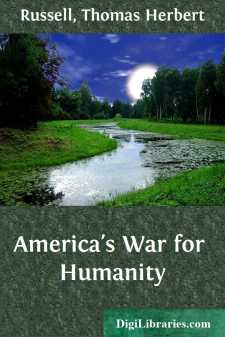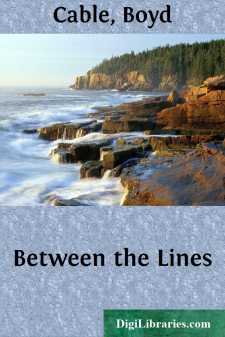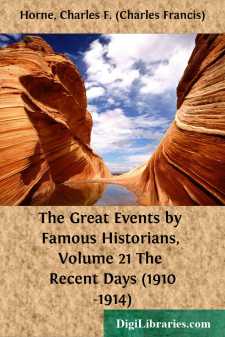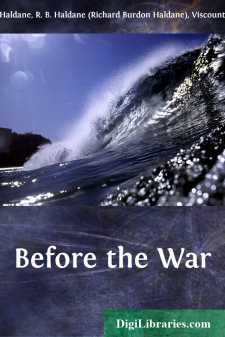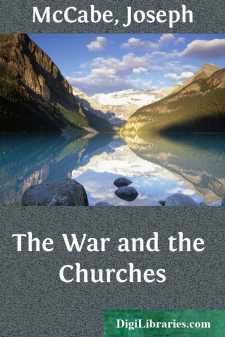History
- Africa 30
- Americas (North Central South West Indies) 50
- Ancient 68
- Asia 58
- Australia & New Zealand 8
- Canada 41
- Caribbean & West Indies 1
- Civilization 20
- Eastern Europe 12
- Europe 310
- Expeditions & Discoveries 60
- General 77
- Historical Geography 1
- Jewish 9
- Latin America 3
- Medieval 8
- Middle East 13
- Military 248
- Revolutionary 8
- Study & Teaching 5
- United States 353
- Western Europe 56
- World 13
History Books
Sort by:
CHARLES F. HORNE It is related that in 1661, on the day following the death of the great Cardinal Mazarin, the various officials of the State approached their young King, Louis XIV. "To whom shall we go now for orders, Your Majesty?" "To me," answered Louis, and from that date until his death in 1715 they had no other master. Whether we accept the tale as literal fact or only as the...
more...
CHARLES F. HORNE Our modern civilization is built up on three great corner-stones, three inestimably valuable heritages from the past. The Græco-Roman civilization gave us our arts and our philosophies, the bases of intellectual power. The Hebrews bequeathed to us the religious idea, which has saved man from despair, has been the potent stimulus to two thousand years of endurance and hope. The Teutons...
more...
DEDICATION To the soldiers and sailors of the United States and Canada; to the men of the armies and navies of nations allied with us; to the splendid courage and devotion of American, French, British and Belgian women, who have endured in silence the pain of losses worse than death, and never faltered in works of mercy for which no thanks can ever pay; to all the agencies of good that have helped save...
more...
uring the eighteenth century a remarkable change swept over Europe. The dominant spirit of the time ceased to be artistic as in the Renaissance, or religious as in the Reformation, or military as during the savage civil wars that had followed. The central figure of the world was no longer a king, nor a priest, nor a general. Instead, the man on whom all eyes were fixed, who towered above his fellows,...
more...
by:
Boyd Cable
BETWEEN THE LINES THE ADVANCED TRENCHES 'Near Blank, on the Dash-Dot front, a section of advanced trench changed hands several times, finally remaining in our possession.' For perhaps the twentieth time in half an hour the look-out man in the advanced trench raised his head cautiously over the parapet and peered out into the darkness. A drizzling rain made it almost impossible to see beyond a...
more...
During the war of 1812-14, between Great Britain and the United States, the weak Spanish Governor of Florida—for Florida was then Spanish territory—permitted the British to make Pensacola their base of operations against us. This was a gross outrage, as we were at peace with Spain at the time, and General Jackson, acting on his own responsibility, invaded Florida in retaliation. Among the British...
more...
AN OUTLINE NARRATIVE TRACING BRIEFLY THE CAUSES, CONNECTIONS, AND CONSEQUENCES OF THE GREAT EVENTS THE RECENT DAYS (1910-1914) CHARLES F. HORNE The awful, soul-searing tragedy of Europe's great war of 1914 came to most men unexpectedly. The real progress of the world during the five years preceding the war had been remarkable. All thinkers saw that the course of human civilization was being...
more...
CHAPTER I THE WORLD'S GREATEST CONTEST The Censorship—The Warship "Audacious"—Mine or Torpedo?—The BattleLine—War by Gasolene Motors—The Boys from Canada—The Audacity of it. The war of 1914 is not only the greatest war in history but the greatest in the political and economic sciences. Indeed, it is the greatest war of all the sciences, for it involves all the known sciences of...
more...
CHAPTER I INTRODUCTION The purpose of the pages which follow is, as I have said in the Prefatory Note, to explain the policy pursued toward Germany by Great Britain through the eight years which immediately preceded the great war of 1914. It was a policy which had two branches, as inseparable as they were distinct. The preservation of peace, by removing difficulties and getting rid of...
more...
by:
Joseph McCabe
CHAPTER I THE RESPONSIBILITY OF THE CHURCHES The first question which the unprejudiced inquirer will seek to answer is: How far were the Churches able to prevent, yet remiss in using their influence to prevent, the present war? There is, unhappily, in these matters no such thing as an entirely unprejudiced inquirer. Our preconceived ideas act like magnets on the material of evidence which is submitted...
more...




